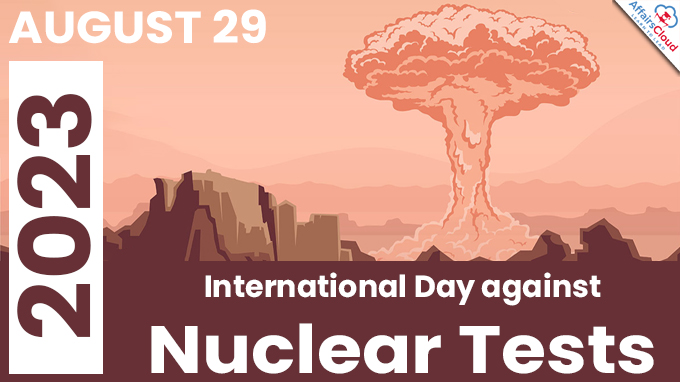
- The day also promotes the cessation of nuclear tests as one of the vital parts of achieving the goal of a nuclear-weapon-free world.
Background:
i.The United Nations General Assembly (UNGA) adopted the resolution A/RES/64/35 on 2 December 2009 and proclaimed the 29th August of every year as the International Day against Nuclear Tests.
ii.The resolution was initiated by the Republic of Kazakhstan along with several sponsors and cosponsors.
iii.The first-ever International Day against Nuclear Tests was observed on 29th August 2010.
Why August 29?
The observance of International Day against Nuclear Tests commemorates the closure of the Semipalatinsk Nuclear Test site in Kazakhstan on 29 August 1991.
Nuclear Test:
Nuclear weapons tests are experiments carried out to determine the performance, yield, and effects of nuclear weapons.
The long-term environmental effects of nuclear testing are contamination of surface soil and groundwater, land disturbances in the form of craters or partially collapsed mountains and the addition of radionuclides to sediments in seabeds.
Since 1945, more than 2,000 nuclear tests have affected people, poisoned the air and destroyed landscapes around the world.
1st Nuclear Test:
The world’s 1st nuclear explosion occurred on 16th July 1945. A plutonium implosion device was tested at a site in Los Alamos, New Mexico, on the plains of the Alamogordo Bombing Range, known as the Jornada del Muerto.
The test was code-named as “Trinity”.
- The test was conducted by the United States Army, following which, the United States of America bombed Japan’s Hiroshima and Nagasaki in August 1945.
India’s 1st Nuclear Test:
Operation Smiling Buddha, also known as Pokhran-I was the first successful nuclear weapons test of India.
The test was conducted on 18th May 1974 in the Indian Army’s Test Range in Pokhran, Rajasthan.
This marked the emergence of India as a nuclear power.
Comprehensive Nuclear-Test-Ban Treaty (CTBT):
Comprehensive Nuclear-Test-Ban Treaty (CTBT) is one of the main mechanisms for eradicating nuclear weapons testing, adopted by the UNGA on 10th September 1996.
At present, 186 countries across the globe have signed the treaty and 178 have ratified it.
All the states with significant nuclear capabilities should ratify the treaty for it to enter into force.
Note: India has decided not to sign the CTBT, since it views nuclear weapons as a protective barrier against security threats from neighbouring countries (Pakistan & China).
Related observances:
The UN observes 26th September of every year as the “International Day for the Total Elimination of Nuclear Weapons”, to promote the total elimination of nuclear weapons, through the mobilization of international efforts.
About the United Nations General Assembly (UNGA) :
The UN General Assembly (UNGA) is one of the six principal organs of the UN
- Dennis Francis of Trinidad and Tobago elected 78th UNGA president
77th UNGA President– Csaba Korosi
Headquarters– New York, United States of America(USA)